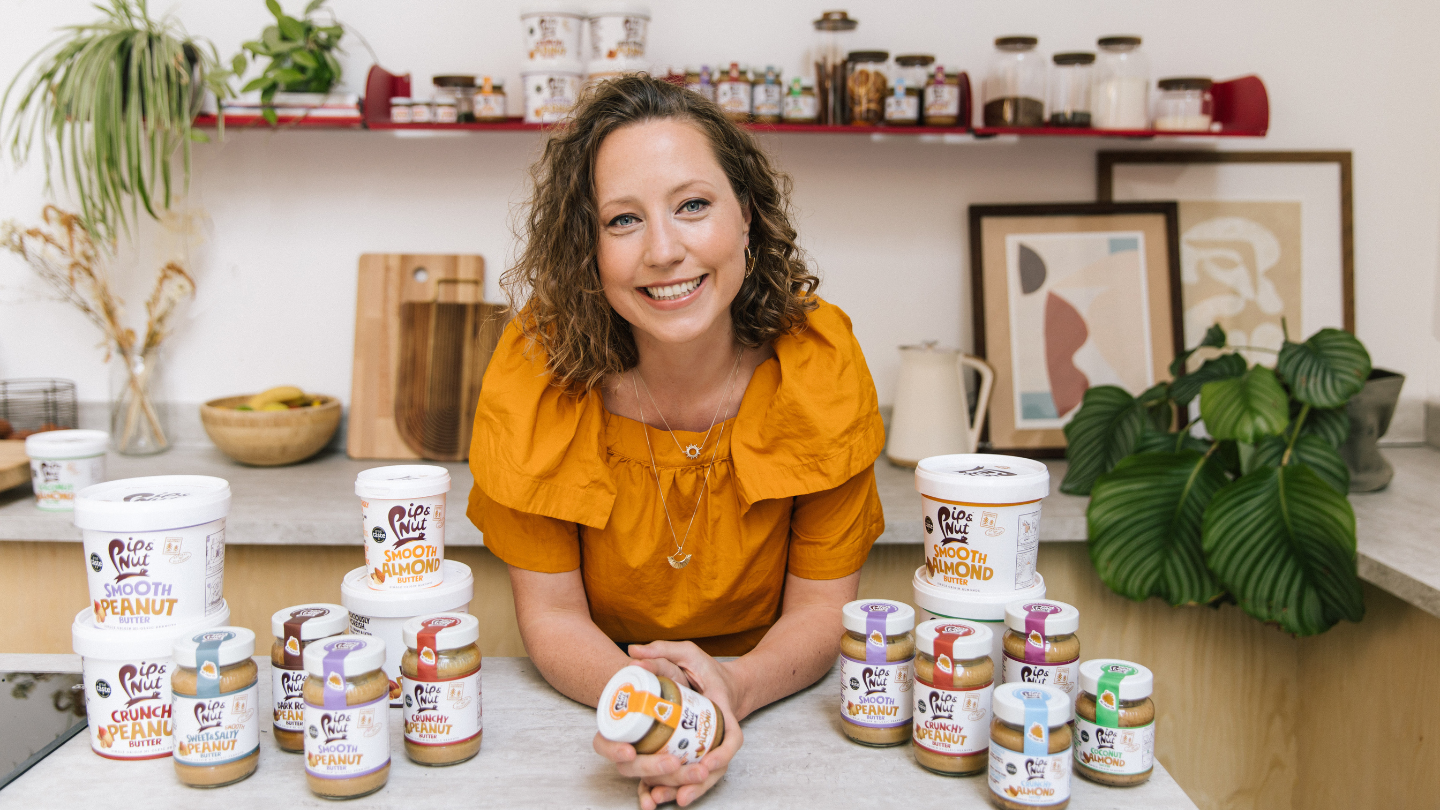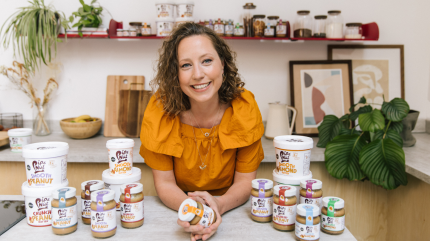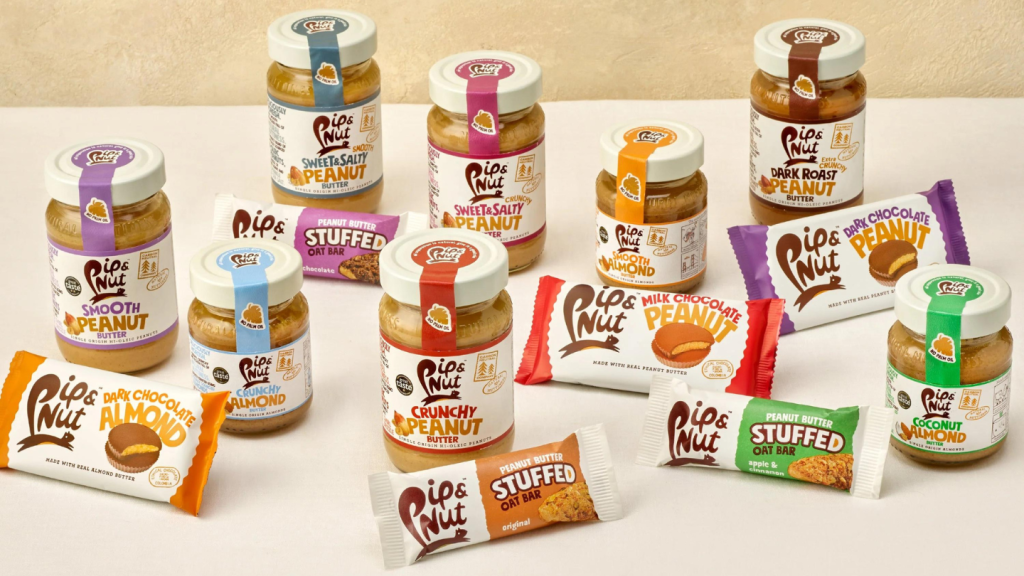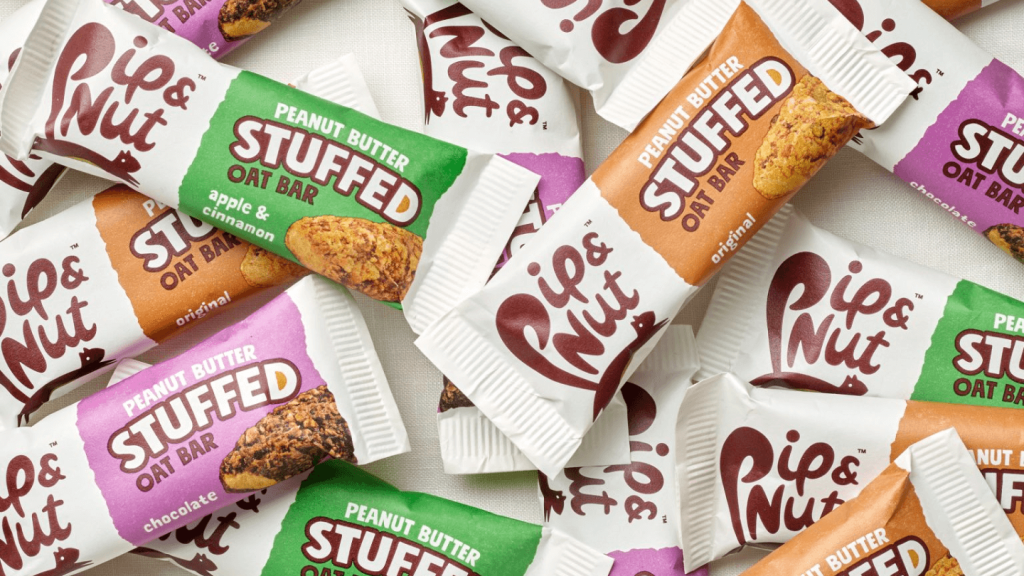

UK-based Pip & Nut is a natural nut-butter manufacturer which was founded in 2013 by Pip Murray. The business launched a new range of snack bars last month, expanding its snacks portfolio beyond the nut butter cups range.
The B-Corp-certified business is listed in several major retailers in the UK, including Waitrose, Sainsbury’s, Boots, Asda, Morrisons and Tesco.
Murray sat down with Just Food to talk about sustainable nut sourcing, the potential in better-for-you snacking and how to innovate in the “crowded” nut-butter space.
Henry Mathieu (HM): You recently released some new snack bars – how are you viewing your snacking portfolio for the future?
Pip Murray (PM): It’s a big focus over the next few years, looking at how we continue to broaden out our snacking portfolio, alongside obviously growing our nut butter business. I guess for us, the reason why we exist is to create really delicious products that are as good for you as they possibly can be, in terms of better-for-you and better-for-you than other things in the market, and then also trying to do a bit better from a planet point of view as well.
So when we looked at the snacks category, particularly cereal bars, there’s lots of problems there. There are still a lot of brands there which are creating products that are filled with ingredients that you probably wouldn’t recognise in your own kitchen, from gums to stabilisers and flavourings to all sorts, and loads of them also use palm oil. If you look at any back of pack, probably every single brand you pick up has palm oil in it, and that was one of the key reasons why I started up the business, because nut butter nearly always contained palm oil, which I didn’t agree with, and so I guess that’s why we stepped into the oat bar space. Even with our nut butter cups, it was an opportunity to help bring better products that are genuinely natural.
HM: Do you see a synergy between the nut butter and snacks portfolios going forward, or will you look to diversify the snacking side?
PM: I think nuts is obviously a synergy, and for sure, they should be very like nut-led products, which we like because nuts are a good source of protein. They’re high in fibre, generally good at filling you up. So it’s definitely one of the reasons why we exist. I mean, the snack products will always have nuts within them. I guess the good thing about it is that whilst you might eat our almond butter or peanut butter at home for breakfast or whatever throughout your day, I guess these products you can have out and about. So when we think about our consumers, and how can we help our consumers eat better every day, then having things that they can also eat whilst they’re out and about as well as having stuff that they eat at home also makes sense.
Access the most comprehensive Company Profiles
on the market, powered by GlobalData. Save hours of research. Gain competitive edge.

Company Profile – free
sample
Your download email will arrive shortly
We are confident about the
unique
quality of our Company Profiles. However, we want you to make the most
beneficial
decision for your business, so we offer a free sample that you can download by
submitting the below form
By GlobalData
HM: You recently joined a sustainable sourcing initiative, started by Tony’s Chocolonely – what does that entail?
PM: We heard about Tony’s Open Chain and what they were doing probably about a year and a half ago, and obviously, we’re big admirers of Tony’s Chocolonely in terms of how they do business and their commitment in terms of how they’re transforming the cocoa industry. So yeah, we were actually speaking to them about how we could potentially use their cocoa, and they spoke to us about Tony’s Open Chain and what they’re trying to achieve there.
So, effectively, we buy the cocoa beans through Tony’s Open Chain, which is an initiative that ensures that farmers are paid a living income reference price that’s above fair trade to enable them to get the right living standards for farmers in Ghana and Côte d’Ivoire.
They also have a number of other initiatives which fall under their so-called five sourcing principles, which link to ensuring that there is no deforestation, that they have long term contracts, that they pay a living wage, etc. So things that thread into the Tony’s Open Chain model. And I guess as a brand, we also had our nut butter cups range, which we use cocoa in. We felt that we really wanted to align with their mission and become a mission ally to support their work and to solve the issues in the cocoa industry. So we effectively reformulated our nut butter cups using Tony’s Open Chain and chocolate, and then we’re able to put their stamp on it, if you like.
HM: What kind of effect will the association with Tony’s Chocolonely have on Pip & Nut?
PM: I mean, you can’t fault Tony’s Chocolonely in terms of what they’ve managed to do, in terms of making quite a difficult topic very accessible from a consumer point of view. I think we often think about ethics and chocolate, it can all sound a bit the same, or consumers have lost a bit of trust with brands who say they’re doing one thing, but then you find it in the press that they’re actually not following through in terms of their commitments. I think what Tony’s has done, because they’ve got such a good way of sourcing all their beans, being fully traceable through their system, both financially, but also physically, through their supply chain, that they’ve been able to give a real robustness to their methodologies.

I think that it’s a great association. And for us, we’re the experts in peanut butter and so within our nut butter cups, that’s where our strength lies. And we love the fact that, from their point of view, they’re the experts in chocolate, we can work with that and enhance our products. Yeah, for sure, I hope that the awareness of what they’re trying to do, and therefore that logo that you see on the front of pack will have some level of understanding in terms of what that means with consumers, about eradicating exploitation in the cocoa industry.
HM: Can you tell us a bit more about your wider sustainability strategy, such as sourcing your nuts?
PM: The challenge is really different. We source our almonds from California, and our peanuts are coming from Argentina. So obviously, the challenges in those regions are very different to that those of like Ghana and Côte d’Ivoire. Our focus though, we’re Pip & Nut, and nuts are a massive part of our business, and it’s where we focus a lot of our energy not only because all of our products contain nuts, and it’s pretty much the only ingredient in some of them. But also from a carbon point of view, nuts make up about 70% of our carbon footprint. So if we can start to kind of improve the sourcing and reduce our overall footprint by using better kind of farming practices, then it will overall reduce our carbon footprint significantly.
So it’s a bit of a two-prong thing around making sure we’re sourcing really well through our nuts, and in turn, that will hopefully have an impact on our carbon footprint. An example of the things that we’re working on in that industry in peanuts, for instance, one of the biggest challenges is around the fact that peanuts are grown in the ground, and to harvest them, you have to pull up the soil. That can disrupt the carbon in the soil. It’s also quite a big industry over there, so what we’re working on is looking at regenerative practices over in Argentina. So we’ve joined a partnership with likes of like Mars and other big manufacturers, of which, we’re the smallest. There’s five of us in this group, and we’ve started this sustainable agriculture initiative to start to map better regenerative practices on the peanut industry.
HM: How has your collaboration with Butternut Box into pet food last year fared?
PM: That was a little partnership that we did with them, and it was only a limited run, so it wasn’t a permanent part of our range, and was really just a bit of fun as much as anything else. Because we noticed that the amount of people that tag us in Instagram posts with their dogs eating the last bit of the jar of nut butter or peanut butter.
HM: So you’re not looking to work in pet food further?
PM: Not yet. You never know, but we do sometimes dabble in thinking, should we launch a peanut butter for dogs? But now, at the moment, it’s not part of the plan.
HM: What are the biggest consumer trends that are driving nut-butter sales at the moment?
PM: I think naturalness is probably the key driver. You know, products that don’t contain palm oil are growing still, and they’re growing faster than the slightly more processed side of them in our category. So it is 100% a driver. People looking for something that has fewer ingredients, that is just more simple, not got any crap in it, basically. That is a key driver.

I guess, with that, we do offer generally a little bit of premium in the market as a result of that, a more natural offering. But I think the key thing that we’re wanting to make sure is that it’s a very accessible premium, it is not a luxury product that we’re selling here. It’s something that hopefully most people could afford. That’s always something that we’re making sure we drive the right balance because we want Pip & Nut to be a brand that most people pick up and see as something for them. But for sure, natural products that don’t contain palm oil are definitely growing faster than the rest of the category. Well, except for private label; private label continues to grow quite fast, but if you look at the branded side of things that’s what’s driving the growth.
HM: How have you been dealing with inflationary pressures and rising supply chain costs over the last couple of years? Did you adjust your pricing strategy?
PM: Last year and the year before that, we experienced quite significant cost increases. It was quite challenging. I think when you’re a smaller brand like ours, you probably have less ability to be able to just pass on all that price over to the consumer. It’s really difficult to get that through with your retailers. We did do one small price move though it was very marginal. It was a fraction, less than a quarter of the cost that we actually had hit our business.
So we made the choice that actually we’ll only pass on a little bit, but we’ll look at how we can drive efficiencies throughout our brand and in a short term basis, make a margin to be able to continue to grow and continue as a business. But yeah, it was difficult, and I guess it’s about working collaboratively with your manufacturing partners and suppliers, to find solutions, but hopefully they can bring you back into a more stable position.
But, I think in the last six to nine months, there have been fewer challenges from an inflationary point of view. But for us, what we’re always managing outside of what happened in the last two or three years is commodity fluctuations, and that’s always going to be the challenge for us, because that’s such a big part of our cost of goods. So, you know, particularly when you have summers where you know climatic changes happening in certain parts of the world that impact crop volumes and yields, that’s really, actually what’s more of a concern for us, I think, at the moment, ensuring that we really have a handle on that.
HM: Are you looking to expand Pip & Nut beyond the UK?
PM: At the moment, very much just focused on the UK, and I think particularly because we’re broadening our product range, and have just launched that new range of snacking products. That’s been the big focus for us in terms of growth. But yeah, for sure, we’ve got an understanding of where we could go if we were to go international. But at the moment, it’s not something we’re pressing on.
HM: Are you seeing a lot of competitors in the clean-label nut butter industry? How are you looking to innovate?
PM: It is a crowded space, but I just don’t think the job is done. The majority of the products sold, in particular cereal bars, are not clean-label by any stretch of the imagination. So I just think there is, there is still room for brands to be better. I definitely think there is room.
I think function is a really interesting one. Obviously still quite a crowded space whenever you think about functional benefits. But for sure, looking at how you can add nutritional benefits for consumers. I guess more and more consumers want to buy from brands that they trust and buy from a value point of view, sustainability point of view. So I like to think that as our brand, that’s B Corp, that’s very much focused on doing the right thing from the consumer’s point of view. It’s not just about what you make, it’s how you how you make things and how you go about doing business. That is going to become more increasingly important, I believe.
HM: Following Mars’ recent $36bn deal to buy Kellanova, it seems that that the snacking industry has been given a huge vote of confidence. How are you seeing the balance between better-for-you snacking and the more indulgent side?
PM: I think that if you can drive healthy eating to the mainstream then that is the unlocker. The rise in people’s awareness of ultra-processed foods, I think, again, that’s going to have a good, strong influence on consumer buying patterns and what they’ll be looking for is things that are more natural than those that aren’t. So I think that’s a really good thing.
I guess there’s also government legislation that comes into force, and we’ll see what happens with the Labour government, around how much they crack down on products that are not very good for you and are more processed. So I think there’ll be a general shift, but it all has to be accessible, and I think that’s sometimes the challenge with healthier products is that they can maybe be too expensive. There’s a big swathe of society who maybe can’t afford that. So that’s what we’re focused on, is balancing that premium to making sure we’re also mainstream.

